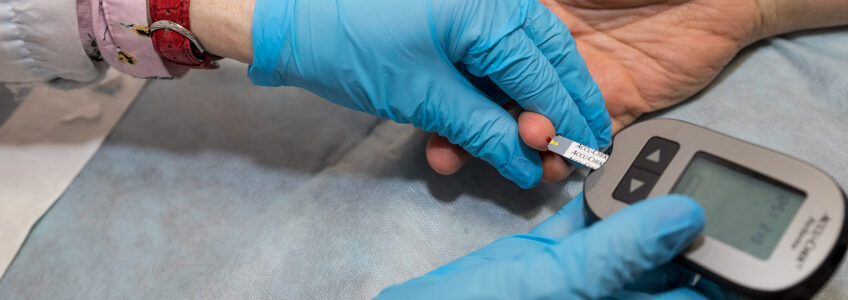
According to the CDC, nearly 30% of seniors over the age of 65 have diabetes. Some seniors may not be diagnosed with diabetes yet, but they still have it. And that raises their risk for diabetic eye disease.
November is Diabetic Eye Disease Awareness Month, and now is the time to learn about diabetic eye disease and how it could affect your senior parent. If your parent has diabetes, they are at risk of diabetic eye disease. But, with proper management of their diabetes, they can lower the risk of getting diabetic eye disease.
Elder care can help your senior parent avoid getting diabetic eye disease by helping them make healthier choices. An elder care provider will make sure your senior parent is eating healthy meals, and they can help your parent manage their diabetes symptoms at home.
What Is Diabetic Eye Disease?
Diabetic eye disease is caused by long-term high blood sugar, inflammation, and generally unmanaged diabetes. Some of the conditions that are considered part of diabetic eye disease are:
- Nonproliferative diabetic retinopathy (NPDR)
- Proliferative diabetic retinopathy (PDR)
- Diabetic macular edema (DME)
- Diabetic glaucoma
If your senior parent develops diabetic eye disease, it can cause your parent to have:
Blurry Vision
One of the earliest signs of diabetic eye problems is blurry vision. This can come and go and might affect just one eye or both. High blood sugar can cause the lens inside the eye to swell, which changes how well your parent can see.
Blurry vision might make it harder to read, drive, or recognize faces. Your parent may think they just need new glasses, but it could be a sign of something more serious. A doctor can help tell the difference and check for damage.
Floaters and Spots
Floaters look like small spots, strings, or shadows that move around in your vision. They are often caused by bleeding in the eye from damaged blood vessels. This can happen when diabetic retinopathy, a common form of diabetic eye disease, gets worse.
If your parent suddenly sees more floaters than usual or starts seeing flashes of light, they should see a doctor right away. These changes could be a warning of a retinal tear or detachment, which can lead to blindness if not treated quickly.
Trouble Seeing at Night
Seniors with diabetic eye disease may have a hard time seeing in low light. This can make it difficult to walk around at night or drive after dark. They might stumble on steps or miss obstacles that they used to notice easily.
Trouble seeing at night is often caused by damage to the retina, the part of the eye that helps you see in dim light. It can also be a sign of other vision problems like cataracts, which are more common in people with diabetes.
Colors Look Faded or Washed Out
Another way diabetic eye disease can affect vision is by making colors look dull or faded. Your parent might say that things don’t look as bright or clear as they used to. This happens when the retina is damaged or the eye’s lens becomes cloudy.
Color changes are easy to miss, but they can affect your parent’s ability to enjoy hobbies, recognize signs, or even notice bruises or rashes on their skin.
Partial or Complete Vision Loss
If diabetic eye disease isn’t managed, it can lead to serious vision loss. This might happen slowly over time or suddenly after bleeding or retinal detachment. In some cases, your parent may lose vision in one part of their eye or go completely blind in one or both eyes.
The good news is that regular eye exams, good blood sugar control with the help of elder care, and treatment from an eye doctor can prevent or delay many of these problems.
Elder Care Can Help Seniors Manage Diabetes
Diabetic eye disease can seriously affect your parent’s vision and daily life. Watching for changes and getting regular checkups can help protect their sight. If your parent has diabetes, make sure their eyes stay a top priority and get elder care services so a care provider can help your parent manage their diabetes better.
If you or someone you know needs Elder Care in Rochester, MN, contact Adara Home Health. We provide quality and affordable home care services for many fragile or senior members in the communities we serve. Call us at (888) 525-7742 for more information.
Source:

